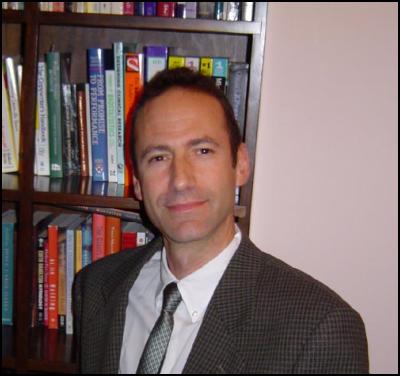Book Review: Has Psychiatry Become Unhinged?
Has Psychiatry Become Unhinged? This Doctor Says Yes
by Martha Rosenberg
Click to
enlarge
Author of Unhinged, Daniel
Carlat
Unhinged, The Trouble with Psychiatry--A Doctor's Revelations about a Profession in Crisis. By Daniel Carlat. Free Press, 256 pp., $25
At a press briefing at the American Psychiatric Association meeting in May in which new research about olfactory reference syndrome (people who think they smell) and links between depression and allergens was presented, a reporter's pointed question took many aback:
"How do we know your work won't be used to make bad breath or hay fever mental disorders?" the reporter asked the researchers, whose smiles faded.
The reporter was Daniel Carlat, MD and his new book, Unhinged, The Trouble with Psychiatry -- A Doctor's Revelations about a Profession in Crisis, continues the shots-across-the-bow to the psychiatric establishment.
Doctors who join pharma speaker bureaus? "Hired guns."
The Vagus Nerve Stimulator for depression? "A blemish on the reputation of both the FDA and American Psychiatry."
The popular ADHD diagnosis? "A judgment based on the psychiatrist's best guess."
Prescription drug costs? "Neither the patient nor the doctor…foots the bill."
Joseph Biederman, MD's promotion of Risperdal at Massachusetts General Hospital? "The MGH department of child psychiatry had allowed itself to become a research factory for various drug companies."
Antidepressant effectiveness? "Only about half -- 51 percent -- of trials are positive."
The psychiatric field itself? "Many of the leaders of our field have allowed themselves to become paid puppets of the pharmaceutical industry."
Unlike industry exposes by former pharma executives, Carlat has not left his field and continues to hold a faculty position at Tufts and see patients. And though he assails psychiatric training and education, research, current practice, biotechnology, turf battles and trends -- other fields add knowledge he says; psychiatry adds diseases -- anti-psychiatry activists will find him a moderate: He still prescribes the top psychoactive drugs, has taken them himself and even defends the efficacy of electroconvulsive therapy (ECT.)
(In an amusing anecdote in Unhinged, Carlat starts to have a panic attack in a sauna hot light airplane and finds he has no anxiety meds with him. He ends up using cognitive behavioral therapy (CBT) techniques on himself -- and they work.)
Because psychiatry deals with non-measurable phenomenon -- even the serotonin theory of depression isn't chemically proved he writes -- it has over embraced the certitude of psychopharmacology to compensate, he says. But do psychiatrists, motivated by mysteries of the human mind and the desire to help people, really want to become mere "pill pushers" whose only contact with patients is 15 minute "med checks" as they hand patients off to less trained professionals for "therapy"?
"If I did therapy exclusively [as opposed to med checks] I would have to take a 40-50 percent pay cut," Carlat admits in one of many passages that show he is not exempt from the criticism he levels. In fact, many first heard of Carlat in 2007 when his article about promoting the antidepressant Effexor for Wyeth (now Pfizer) for a year, called Dr. Drug Rep, ran in the New York Times magazine.
In an interview, Carlat told me he got less "pushback" from that article than one that ran in the magazine in April called Mind over Meds that provoked another psychiatrist at the American Psychiatric Association (APA) meeting last month to attack him.
"Mina Dulcan, MD [Chair of Child Psychiatry at Northwestern Medical School] was signing textbooks and when I introduced myself she said, 'How dare you write in the New York Times that your therapy training at Mass General was terrible, and that you had a so-called great awakening,'" Carlat told me. "How are you any different from the drug companies, writing your article to sell your book and newsletters? What a disservice you have done to psychiatry!'"
Carlat publishes the Carlat Psychiatry Report, a monthly CME newsletter and the Carlat Child Psychiatry Report edited by Caroline Fisher, MD from the University of Massachusetts Medical School, Worcester.
And there has been other fallout, says Carlat. He voluntarily resigned his elected seat as Massachusetts representative to the APA Assembly, a governing body, upon publishing Unhinged.
"In Unhinged, I support the idea of psychologists prescribing medicine and the development of a new training program that would be a hybrid between medical school and psychology graduate school," Carlat told me. "Even though I was asked to stay on as representative, I didn't want to put my colleagues in uncomfortable positions."
Why would changing psychiatric training and even who prescribes meds make colleagues uncomfortable?
ENDS


 Binoy Kampmark: Bratty Royal - Prince Harry And Bespoke Security Protection
Binoy Kampmark: Bratty Royal - Prince Harry And Bespoke Security Protection Keith Rankin: Make Deficits Great Again - Maintaining A Pragmatic Balance
Keith Rankin: Make Deficits Great Again - Maintaining A Pragmatic Balance Richard S. Ehrlich: China's Great Wall & Egypt's Pyramids
Richard S. Ehrlich: China's Great Wall & Egypt's Pyramids Gordon Campbell: On Surviving Trump’s Trip To La La Land
Gordon Campbell: On Surviving Trump’s Trip To La La Land Ramzy Baroud: Famine In Gaza - Will We Continue To Watch As Gaza Starves To Death?
Ramzy Baroud: Famine In Gaza - Will We Continue To Watch As Gaza Starves To Death? Peter Dunne: Dunne's Weekly - A Government Backbencher's Lot Not Always A Happy One
Peter Dunne: Dunne's Weekly - A Government Backbencher's Lot Not Always A Happy One